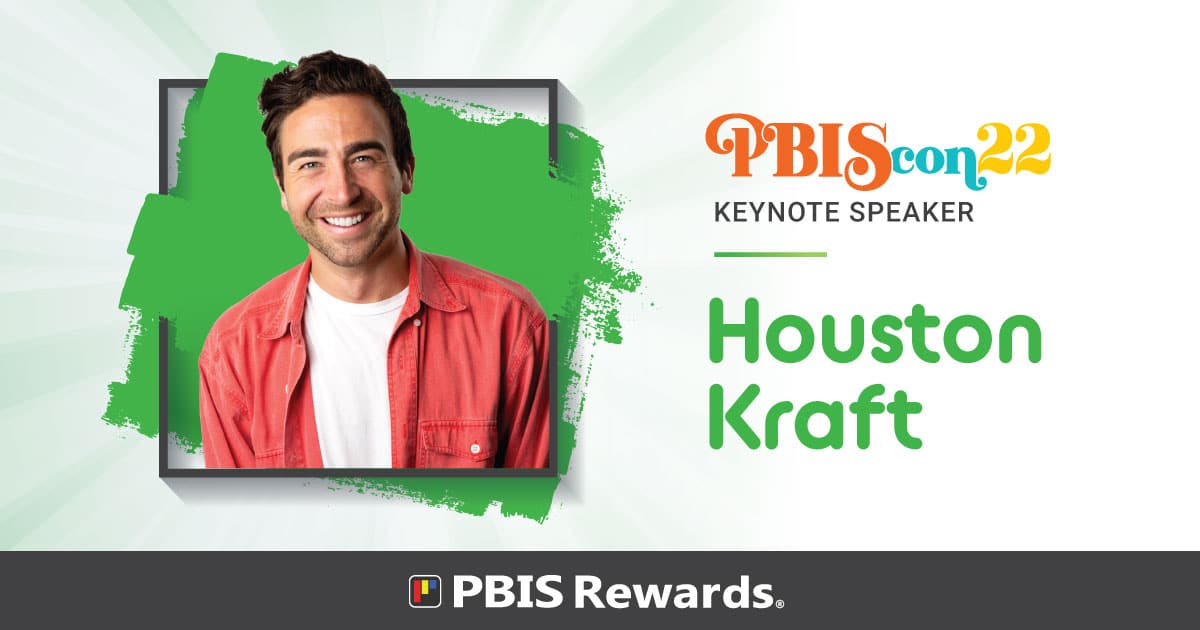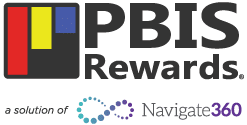PBIScon22 is coming! As we’re gearing up for our second virtual conference, we’re lining up some fantastic keynotes and breakout sessions. We’re pretty excited about what we have in store for you, and we want you to meet one of our keynote speakers.
Houston Kraft is one of the co-founders of Character Strong, an organization that provides social and emotional learning curricula for schools around the world. He’s an author, curriculum designer, professional speaker, and kindness advocate who speaks at schools, conferences, and events all over the world. PBIS Rewards is thrilled to bring him to PBIScon22 as one of our keynote speakers.
Want to know more about Houston? We did a short interview with him to give you a sneak peek of what he’s all about. Read on!
What is your favorite part of giving back to the community?
My favorite quote from Martin Luther King, Jr. (and definitely in my Top 5 quotes of all time) is:
“It’s a reminder to me that anything I give to my community, I also receive. I am an interconnected part of the whole and whatever generosity, kindness, empathy, or goodness I can offer will only serve to make the communities that I am a part of better to exist within.”
You are one of the co-founders of Character Strong. Tell us a little bit about that.
Like most great things in life, CharacterStrong was born out of a relationship. When I was in high school, I attended a summer leadership camp called Mt. Adams. 300 high school students from around Washington State gathered for a week without cell service to discuss being of service. The keynote speaker on the second night was a guy named John Norlin. He told a simple, but profound, story of servant leadership; a story about a decision he made in high school. He decided to arrive one hour early to hold open the front doors of his high school for 182 straight school days. There were plenty of challenges, relationships, and insights he gained as a result. John quickly became an inspiration and hero for me. Over the years, we continued to work together as I came back to camp as a counselor.
After my college years, I began my career as a youth motivational speaker. John was the first person to give me a chance to speak to his school of 1,600 students for their Martin Luther King, Jr. assembly. It kicked off a career of speaking at over 600 schools over the course of 7 years. During this time, John became an award-winning teacher and a district administrator with a focus on developing the Whole Child. In 2016, we decided to come together to create CharacterStrong with a goal of applying and scaling all that we had learned from working in hundreds of schools, building curricula, and integrating our work into school systems to develop social & emotional skills and character.
We now work with over 5,500 schools across all 50 states and 21 countries grades PK-12. Our team of over 30 passionate folks — many of them former educators themselves — work together to develop content that is built on research. This content meets the reality of schools and students today and is relevant to educators and young people alike. We offer professional learning to educators to help them equip young people to be successful.
With your experience in Social Emotional Learning, can you explain what social-emotional learning is?
Our Chief Development Officer at CharacterStrong, Dr. Clayton Cook, helps guide this exact work across various school systems. We view the Tier 1 universal level of support for all students like a good baking recipe, which involves combining specific ingredients to create a desired outcome on purpose, like a chocolate chip cookie.
SEL and character education are essential teaching and learning ingredients of a Tier 1 recipe for success. It entails quality curriculum and effective, engaging instruction that aims to promote specific competencies among students. SEL and character education build students from the inside out. Students cultivate specific knowledge, skills, character traits, and mindsets that enable them to regulate themselves. This, in turn, helps them build and maintain healthy relationships with others, develop a sense of purpose, and make responsible decisions. While the SEL and character education ingredient is essential, it is insufficient alone to achieve the types of outcomes educators want for students. It is when high-quality SEL and character education is part of a safe, predictable, and supportive environment that the probability of desired outcomes goes up.
How do PBIS and SEL go hand-in-hand?
SEL and PBIS are both key ingredients that work together, not against one another. Together they provide a more comprehensive approach to supporting the social, emotional, and behavioral well-being and development of students. PBIS provides an essential environment by establishing common language and practices among educators. These practices cultivate a safe, predictable, proactive, and responsive environment. While SEL is more of an inside-out approach, PBIS is more of an outside-in approach. It establishes a healthy environment through teaching, modeling, and acknowledging agreed behavioral norms. It also develops methods of progressively and compassionately responding to problem behavior. While PBIS is beneficial, it does not emphasize teaching students certain internal competencies that increase motivation and self-regulation. These competencies are important because many students lack the motivation and self-regulation skills to behave consistently with the agreed-upon behavioral norms. This is where the SEL and character education ingredient comes in.
When PBIS and SEL combine with an effective academic curriculum, schools are able to provide a comprehensive Tier 1 system of support for all students. This can prevent problems from developing, promote success-enabling factors (e.g., well-being, belonging, and engagement), and provide a solid foundation for more intensive support to work (e.g., Tier 2 and 3 interventions for students who need support in addition to Tier 1).
As an example, Dr. Cook conducted a study in 2015 examining the effects of combining SEL and PBIS. He compared the effects of SEL alone, PBIS alone, SEL+PBIS, and business-as-usual on internalizing and externalizing needs among students. He discovered that the combination of SEL+PBIS was associated with the greatest reductions in both externalizing and internalizing needs. It is also important to note that SEL alone and PBIS alone were both associated with significant reductions in internalizing and externalizing needs among students when compared to the business-as-usual condition. The findings from this study provide support for the notion of combining SEL and PBIS as essential, complementary ingredients of a Tier 1 recipe for success.
You recently published a new book titled Deep Kindness. What can readers expect from your book?
They should expect to smile at least a few times, laugh once or twice, reflect a whole lot, and be challenged to reinvent their perspective on and practice of Kindness in their life. Deep Kindness is a distillation of all that I’ve learned as a speaker across 600 events both talking about and listening to stories of connection, compassion, and kindness. It is a reflection of our continued learnings at CharacterStrong on how to effectively teach the skills that I would argue are foundational to the behavior of Kindness towards ourselves and others.
Here is a passage that is a good tone set for what you can expect in the book:
“I’ve worked with over six hundred schools around the world, and one of the most common kindness posters I’ve seen in these schools reads like this: ‘Throw Kindness around like confetti!’ I want to gently tear this poster down from the internet and the hallways… One of the biggest barriers to a kinder world is the way we speak about kindness. When we make something sound easy, we don’t allocate the necessary resources, energy, or time to actually improve at it. The kind of kindness the world needs isn’t being accurately portrayed, let alone taught. As a result, there is a glaring delta between perceived importance and actual action.
What if we talked about kindness in a way that honored how hard it is? What if we taught skills in our education system that supported the challenging and messy work of Deep Kindness in our lives?
Deep Kindness. Not Confetti Kindness.
Simple and confetti-like actions of kindness are a piece of the puzzle, but they aren’t the whole picture.
Clearly outlining the differences between these concepts is what this book is all about. It’s about offering a more thoughtful vocabulary for the critically important concept of kindness.”
We are SO excited to have you at PBIScon22 this summer! What are you looking forward to the most at the conference?
In order for change to happen in schools (or in our world), people need to feel excited AND equipped. We need to know why we are doing things and how to do them well. Everything I know about PBIScon22 is related to exactly this! It’s about bringing inspiration alongside practical application to help educators do their purposeful work with even more effectiveness.
Join us for PBIScon22!
PBIScon22 takes place June 13-14, 2022, and will be filled with great information that you can take back to your classroom or school. You’ll be able to hear Houston speak more in-depth about kindness, SEL, and PBIS during his keynote address at PBIScon22. You won’t want to miss it!
Have you registered for PBIScon22 yet? What are you waiting for? Get your ticket today!


